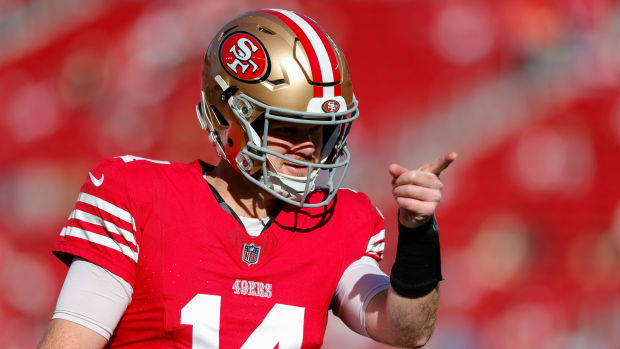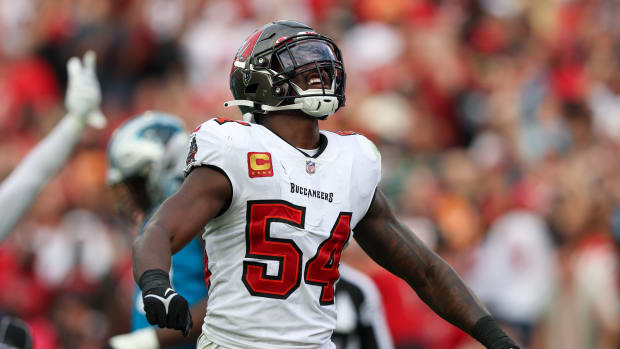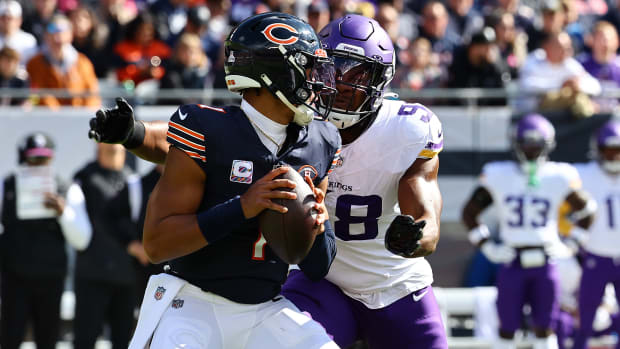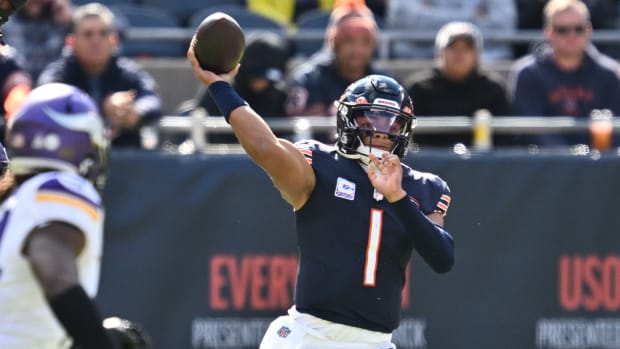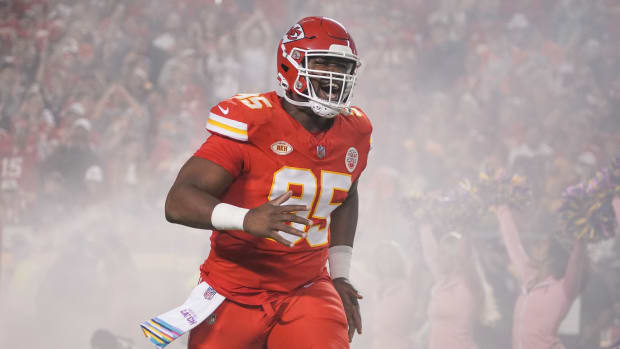Crushing blows to Cam Newton expose how poorly the NFL treats one of its biggest stars
DENVER – It was hard to watch the punishment Panthers quarterback Cam Newton took on Thursday night against the Broncos. It was hard to stomach the beating he absorbed. The Broncos’ defense hit Newton like a human football piñata, hit him early, hit him often, hit him four times in the helmet.
That Newton didn’t miss a snap, leave the game with a concussion, or break in half spoke more to his durability than common sense. Anyone with eyes and a smidgen of empathy could see he needed to enter the NFL’s concussion protocol, needed to come out. Just because he could stand and still play at a relatively high level didn’t mean that he should have continued on Thursday night.
For at least one night, John Elway's big bet on the calm, steady Trevor Siemian paid off
This always seems to be an issue for officials with Newton in particular. He doesn’t look like a prototypical quarterback, or play like a classic drop-back passer. At 6' 5", 245, he’s built like a linebacker. He runs the 40-yard dash in 4.59 seconds, making him a threat to scamper as much as pass. That opens Newton up for more punishment than most of his counterparts. But that doesn’t make it O.K. for officials to miss three helmet-to-helmet hits like they did on Thursday night. “He’s a quarterback, so you’ve got to treat him like one,” receiver Kelvin Benjamin said.
He’s right, even if Newton refused to join the uproar when he met with reporters more than an hour after the game ended 21–20 in favor of the Broncos. “S----y” is how he described his overall mood. The game, he said, was “physical”, the environment “hostile”, the officials a crew “I really like”.
For all the flak Newton took over his postgame press conference following the loss to the Broncos in the Super Bowl last February, he didn’t take the bait on Thursday night. He said it’s not his job to question the officials. He said he never considered leaving the game. He said he had not entered concussion protocol, other than vaguely alluding to being “asked a couple questions but nothing serious” after the game ended.
That’s a problem, particularly for the NFL. It wasn’t long ago—last season, actually—when Rams quarterback Case Keenum was not taken out of a game in which he clearly looked concussed. The league handed out no discipline afterward, even as it promised a similar situation would “never happen again.” The NFL’s actions said more than its empty words. It was fair to wonder, yet again: How seriously did the league take concussions?
By joint agreement, the NFL and its players association agreed to a new procedure to ensure concussion protocol is followed. Either side can call for an investigation, and if both sides haven’t already in regard to the handling of Newton on Thursday night, they should. Without delay.
There’s an uneasiness about football that wasn’t as heightened 10 years ago as it is now. Concussions played a major role in that change, along with all the retired players who committed suicide, or are hurting, their bodies broken, battered. It’s impossible to remove the violence entirely and keep the game’s central appeal—which stems from that very violence, the vicious hits delivered. But changes to the concussion protocol, like having an independent neurologist on the sideline during games, were made to avoid situations like the one that happened (again) on Thursday night.
NFL: Concussion protocols followed after Cam Newton hit
For all the work the NFL has done to protect players from themselves, they have to do more. They have to do better. Newton should have left the game on Thursday. Officials should have whistled the Broncos for their series of helmet-to-helmet hits. Fines aren’t going to induce any meaningful change.
Publicly, Newton said he warned the referees “every time” he was hit in the head. He said he always does that. Publicly, he said the missed calls weren’t the reason the Panthers lost a game they controlled and had a chance to win at the end (Graham Gano missed a 50-yard field goal attempt with four seconds left). Most players, in front of a bank of TV cameras, would say the same thing. They don’t want to make excuses. They don’t want to leave the game.
On Thursday, the fourth helmet-to-helmet blow was delivered by Broncos safety Darian Stewart in the fourth quarter. Afterward, in the Broncos’ locker room, Stewart said he didn’t mean to collide with Newton’s helmet, and his teammates praised Newton’s toughness. Pass rusher Von Miller, who sacked Newton again, called him Superman. But that’s not how Newton looked after Stewart slammed him, as he lay sprawled face-down on the turf in Denver, momentarily motionless. He looked wobbled, beaten, worn.
There was no medical timeout. There should have been. “The truth of the matter is the Denver Broncos are the defending champions for a reason,” Newton said.
The truth of the matter is Newton’s right. It’s not his place to clamor for change here unless he wants to. It’s the NFL’s job, the officials’ job, his team’s job and the independent neurologist’s job to protect him, even from himself. On Thursday night, instead, the system failed him.
































